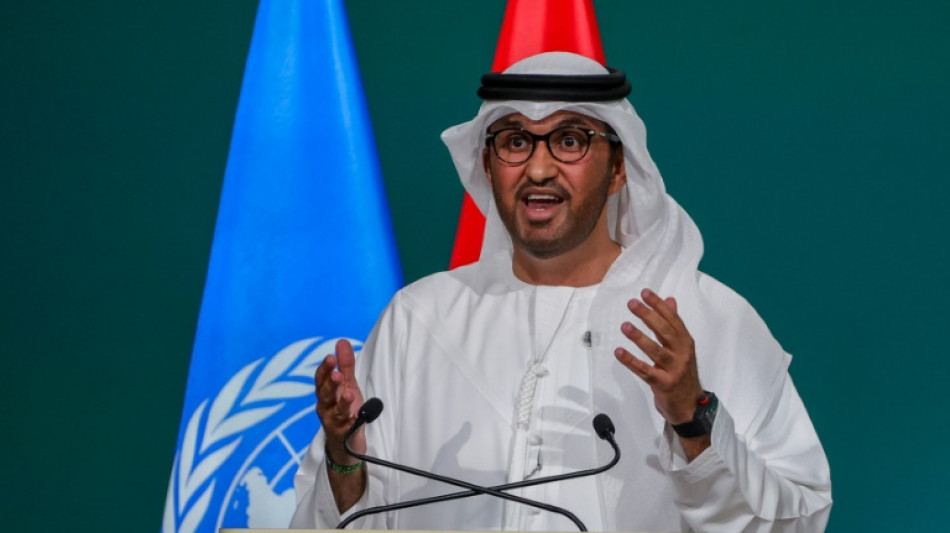
UAE COP28 chief says fossil fuels must be part of climate deal

The Emirati host of the UN climate conference said Thursday that fossil fuels must be part of any deal as the crucial negotiations on global warming opened in Dubai.
The two-week-long talks come at a pivotal moment, with emissions still rising and the World Meteorological Organization declaring 2023 is set to be the hottest year in human history.
In a significant step, nations are expected to formally approve on Thursday the launch of a "loss and damage" fund for climate-vulnerable countries after a year of hard-fought negotiations over how it would work.
But the fund remains to be filled, with rich nations urged to make contributions so the money can start flowing.
World leaders have been urged to move quicker to a clean energy future and make deeper cuts to emissions, with the world off-track to keeping global temperature rises below agreed levels.
There have been high-powered calls for the nearly 200 nations at COP to agree on a phaseout of fossil fuels, a proposal opposed by some powerful nations, and one that has dogged past negotiations.
But Sultan Al Jaber, the president of COP28 and chief of UAE oil giant ADNOC, asked delegates in Dubai to "adopt a different mindset" as negotiations commenced.
"It is essential that no issue is left off the table... we must look for ways and ensure the inclusion of the role of fossil fuels," Jaber said in his opening address.
- 'Pay with people's lives' -
UN Secretary-General Antonio Guterres had earlier told AFP that leaders should aim for a complete "phaseout" of fossil fuels, a position shared by many nations and environment campaigners at the conference.
"If we do not signal the terminal decline of the fossil fuel era as we know it, we welcome our own terminal decline. And we choose to pay with people's lives," UN climate chief Simon Stiell said on Thursday.
Double the size of last year's conference, COP28 is billed as the largest-ever climate gathering, with 97,000 people including Britain's King Charles III and some 180 other heads of state and government expected to attend.
The UN and hosts the UAE say they will be the most important since Paris in 2015, where nations agreed to limit global warming to well below 2 degrees Celsius since the pre-industrial era, and preferably to a safer limit of 1.5C.
The WMO on Thursday said 2023 had shattered a host of climate records, with extreme weather leaving "a trail of destruction and despair".
But the decision for the UAE to host the talks has attracted a firestorm of criticism and intense scrutiny of Jaber.
The 50-year-old Emirati, who also chairs a clean energy company, strenuously denied this week that he used the COP presidency to pursue new fossil fuel deals, allegations first reported by the BBC.
Guterres said Jaber was in a better position to tell the oil industry that a fossil fuel phaseout was necessary than "if he was the member of an NGO with a very solid pro-climate record."
Christiana Figueres, who was UN climate chief when the Paris deal was reached, said she was "giving up hope" that fossil fuel companies could be part of the solution to warming.
But Jaber said oil companies had come to the table this COP like never before, and though they had more to do had "stepped up to join this game-changing journey".
"They can lead the way. And then leading the way will ensure that others follow and catch up," he said.
The UAE sees itself as a bridge between the rich developed nations most responsible for historic emissions and the rest of the world, which has contributed less to global warming but suffers its worst consequences.
A central focus of COP28 will be a stocktake of the world's limited progress on curbing global warming, which requires an official response at these talks.
- Rule by consensus -
Rallying a common position on the matter will be difficult at COP where all nations -- whether dependent on oil, sinking beneath rising seas or locked in geopolitical rivalry -- must take decisions unanimously.
The UAE hopes to marshal an agreement on the tripling of renewable energy and doubling the annual rate of energy efficiency improvements by 2030.
Nations will navigate a range of thorny issues between November 30 and December 12, and experts say geopolitical tensions and building trust could be a huge challenge.
At the opening of the conference, delegates were asked to pause for a minute's silence for civilians killed in the Gaza conflict.
On the sidelines of COP, Israeli President Isaac Herzog will hold talks with diplomats on the release of hostages held by Hamas, his office said. He is also scheduled to speak on Friday within minutes of Mahmoud Abbas, leader of the Palestinian Authority.
Neither US President Joe Biden nor Chinese President Xi Jinping are attending, though Washington is sending Vice President Kamala Harris.
But the US and China, the world's two biggest polluters, did make a rare joint announcement on the climate this month that spurred optimism going into COP.
(Y.Harris--TAG)

 London
London

 Manchester
Manchester
 Glasgow
Glasgow
 Dublin
Dublin
 Belfast
Belfast
 Washington
Washington
 Denver
Denver
 Atlanta
Atlanta
 Dallas
Dallas
 Houston Texas
Houston Texas
 New Orleans
New Orleans
 El Paso
El Paso
 Phoenix
Phoenix
 Los Angeles
Los Angeles


